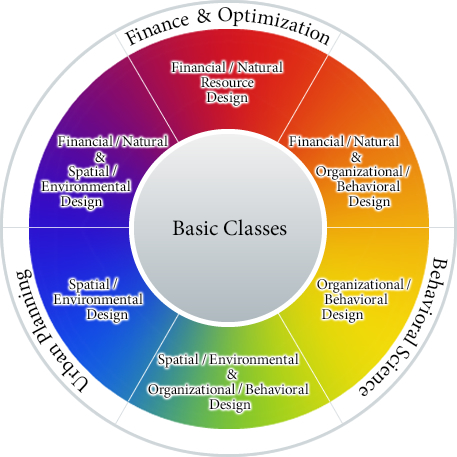Characteristics of the Degree Program
Two Cycles and Five Abilities
The Two Cycles
- Social system cycles: a deductive understanding of social phenomena
- Data analysis cycle: Inductive understanding through data analysis
- →Fostering solution creativity
The Five Abilities
- Find: Ability to understand social phenomena deductively based on theories and empirical rules
- Analyze: Ability to understand social phenomena in an inductive manner based on the analysis of data
- Plan: Ability to design systems to reform society based on an understanding of social phenomena
- Do: Ability to make concrete proposals and conduct social experiments based on the designed system
- See: Ability to measure and evaluate the results of social experiments and recommendations and to deepen understanding of social phenomena
Multi-disciplinary guidance from the Advisory Group (AG) and Research Unit
Curriculum Policy about Master's Program in Policy and Planning Sciences 2025
Aiming to foster knowledge of society and logical thinking ability, embodied in the basic engineering skills that lead to "problem-solving ability," our educational program is composed of the following 3 pillars:
The Specialized Foundation Subjects provides the basic skills required by Policy and Planning Sciences.
The Advanced Subjects builds the ability to construct models from observed phenomena and analyze data. It is composed of 3 overlapping areas:
- Financial / Natural Resource Design: Finance & Optimization.
- Spatial / Environmental Design: Urban Planning.
- Organizational / Behavioral Design: Behavioral Science


The Master Thesis Research aims at establishing and integrating both basic and specialized abilities in the student, using the shared physical and virtual research resource we call the "TPPS Commons," available to both students and faculty through formal Research Units and other research projects, ensuring multidimensional supervision for the student.
Learning Models for Master's Program in Policy and Planning Sciences (Our Degree Program's brochure)
Competencies to be acquired in the degree program
Through the study of this degree program, students will acquire the following competencies.
Generic Competences for Master’s Students
- Ability to use knowledgeAbility to put advanced knowledge to use in society
- Management abilityAbility to appropriately address challenges from every angle
- Communication abilityAbility to express expert knowledge accurately and clearly
- Group skillAbility to cooperate and actively contribute to the achievement of goals as a team
- International characterAwareness to contribute to international society
Competences specified by the Degree Programs in Systems and Information Engineering
- Research abilityBasic knowledge and ability to set research tasks and carry out a research plan in the areas of Policy and Planning Sciences
- Specialized knowledgeAdvanced specialized knowledge and command of the areas of Policy and Planning Sciences
- Ethical viewEthical view and ethical knowledge appropriate for persons with basic research ability or highly specialized professionals in the area of Policy and Planning Sciences
The Master's Program in Policy and Planning Sciences has five educational indicators (Find: Understanding of Social Phenomena, Analyze: Data Analysis, Plan: Institutional Design, Do: Experiments and Recommendations, and See: Measurement and Evaluation) based on "bi-cycle educational indicators based on deductive understanding of social phenomena (social system cycle) and inductive understanding through data analysis (data analysis cycle)" as specialized knowledge and abilities.
Achievement assessment (evaluation of academic achievement)
Through the achievement assessment, students can check the status of achievement of the competencies to be acquired with their supervisor as they proceed to study.
Curriculum Policy about Doctoral Program in Policy and Planning Sciences
Aiming to develop problem specification skills based on problem-finding, quantitative modeling and abstraction, resulting in solution-oriented personnel capable of engineering the futures they imagine, our educational program is composed of the following 3 pillars:
Acquisition of broad-based knowledge through the graduate school's common classes and classes in other fields.
Multi-dimensional research supervision through participation in formal Research Units and other research projects.
Offering a management ability development program that starts with self-discovery of research objectives, and fosters the ability to construct research methodologies.
Besides the standard 3-year course of study, the program includes various alternative plans such as the Early Completion Course which permits finishing in 1 year, an extended 5-year course of studies, as well as the S Course (a combined first and second term course taking 3 years), the A Course (similar but taking 4 years), and the standard 5-year course.
Learning Models for Doctoral Program in Policy and Planning Sciences (Our Degree Program's brochure)
Competencies to be acquired in the degree program
Through the study of this degree program, students will acquire the following competencies.
Generic Competences for Doctoral Students
- Ability to use knowledgeAbility to put advanced knowledge to use in society
- Management abilityAbility to appropriately address challenges from every angle
- Communication abilityAbility to express expert knowledge accurately and clearly
- Group skillAbility to cooperate and actively contribute to the achievement of goals as a team
- International characterAwareness to contribute to international society
Competences specified by the Degree Programs in Systems and Information Engineering
- Research abilityBasic knowledge and ability to set research tasks and carry out a research plan in the areas of Policy and Planning Sciences
- Specialized knowledgeAdvanced specialized knowledge and command of the areas of Policy and Planning Sciences
- Ethical viewEthical view and ethical knowledge appropriate for persons with basic research ability or highly specialized professionals in the area of Policy and Planning Sciences
Achievement assessment (evaluation of academic achievement)
Through the achievement assessment, students can check the status of achievement of the competencies to be acquired with their supervisor as they proceed to study.


